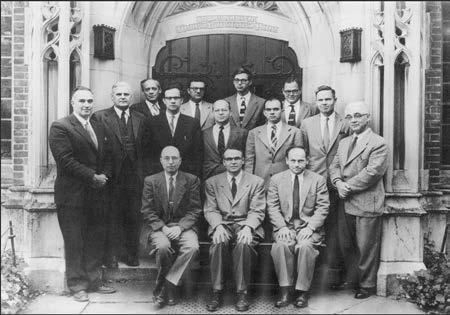by Gerard van der Geer
The first time I saw Hirzebruch was when he visited my thesis advisor, Van de Ven, at Leiden University, where I was a Ph.D. student. I got to know him slightly better when Van de Ven took me to Bonn, where we visited Hirzebruch for a few days in 1974 to discuss Hilbert modular surfaces. At the time I was quite surprised to see how seemingly relaxed he was, though he must have been extremely busy at the time. He took ample time to talk to us, and the same happened about a year later when I visited him alone.
He invited me as a postdoc in 1977 to the Sonderforschungsbereich Theoretische Mathematik, the predecessor of the present Max-Planck-Institut. Shortly after my arrival there we celebrated his fiftieth birthday, the beginning of a long series of similar celebrations.
What struck me when we discussed mathematics was his instinct for the beauty of mathematics, and in fact all that he did bore the hallmark of elegance. The charming way he could lead the program discussion for the Arbeitstagung was another instance of this.
During my time in Bonn he would often invite me to his office and ask my opinion or even advice. In the beginning this surprised me, though I found out that weighing opinions of various people was part of his way of forming an opinion or coming to a decision. This applied especially to his preparation for the Arbeitstagung, where in the month before he was collecting suggestions for speakers and titles. It was surprising to see how he managed, seemingly without effort, to have the outcome of the public program discussions be guided by the ideas he had assembled.
In 1981 he invited me to join him for a Summer Academy of the Studienstiftung in Alpbach in the Tirolean Alps in Austria. This was a two-week seminar where we would work with twenty-five very bright German students on a topic, studying in the morning, hiking in the afternoon. This was the first of seven such summer schools, the last one held in 1997. That was a fantastic experience, and during these seven summer schools I got to know Hirzebruch very well. From an awe-inspiring and paternal mathematician he became a very good friend. Professor Hirzebruch became Fritz. How difficult it was in the beginning to use “Du” instead of “Sie”! He enjoyed these days enormously and often in the later years would recall the happy days in Alpbach.
The charming way in which he would lead the summer school and discourse with students only fed my admiration for him. We would have lectures by students and ourselves in the morning and go hiking the whole afternoon. After dinner there would be interdisciplinary talks, because the Sommerakademie comprised groups from various disciplines, ranging from astronomy, say, to linguistics. After those talks we would gather in the Roter Salon of the Böglerhof Hotel for a beer and discussions with the students. Around 11 p.m. we would change location with our group to the disco, where we would dance — yes, Fritz too! — and continue to discuss as far as the noise admitted, and where we awarded drinks for prize-winning solutions to the exercises and problems. In the early hours of the morning we would return to our rooms and decide whether quick preparation for the lecture the next morning was better done then or after sunrise. To do things efficiently was another lesson he taught by example.

In the later years, besides recalling Alpbach, he would often refer to the “golden fifties”, the years he spent in Princeton, where he proved his landmark Riemann–Roch Theorem. For somebody who lived as a young man in the horrible Nazi time, those years must have been paradise. Inspired by this and his desire to rebuild mathematics in his own country, he formed the idea to have such an institute in Germany. That he succeeded in creating in Bonn one of the world’s best mathematical research institutes is just one proof of his many talents. That it possesses such a pleasant atmosphere is another.
I often noted how he exerted a positive influence on other people just by being there. Or, even without him being there: I often noticed that faced with a difficult situation or decision, I asked myself how Fritz would have acted in such a case, and how much it helped. He was a wonderful person.